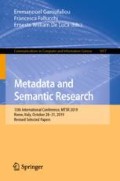Abstract
In recent years, Twitter has become increasingly popular both as a social networking service (where users express their opinions) and as a tool for information retrieval. Many events that are commented, debated or argued online, however, are dynamic and unpredictable in nature, resulting in the need to derive the corresponding dynamic computational methodologies to track and to extract such changing topics, events and relevant content in a timely and unattended manner. In this paper, we propose a framework to accomplish two objectives: periodically obtaining the relevant topics of discussion among authorities and adapting the tracked keywords or hashtags accordingly to retrieve the most relevant possible information in each time window. The application of this framework to a case study reveals how our proposed approach is able to accurately and dynamically track the conversation around an event. Our method could therefore be applied to query Twitter in many domains, such as politics, sport events, marketing campaigns or media engagement, among others.
Access this chapter
Tax calculation will be finalised at checkout
Purchases are for personal use only
References
Turcotte, J., York, C., Irving, J., Scholl, R.M., Pingree, R.J.: News recommendations from social media opinion leaders: effects on media trust and information seeking. J. Comput. Commun. 20, 520–535 (2015). https://doi.org/10.1111/jcc4.12127
Fang, Y., Chen, X., Song, Z., Wang, T., Cao, Y.: Modelling propagation of public opinions on microblogging big data using sentiment analysis and compartmental models. Int. J. Semant. Web Inf. Syst. 13, 11–27 (2017). https://doi.org/10.4018/ijswis.2017010102
Gadek, G., et al.: Topological and topical characterisation of Twitter user communities. Data Technol. Appl. 52, 482–501 (2018). https://doi.org/10.1108/DTA-01-2018-0006
Boyd, D.M., Ellison, N.B.: Social network sites: definition, history, and scholarship. J. Comput. Commun. 13, 210–230 (2007). https://doi.org/10.1111/j.1083-6101.2007.00393.x
Hampton, K.N., Shin, I., Lu, W.: Social media and political discussion: when online presence silences offline conversation. Inf. Commun. Soc. 20, 1090–1107 (2017). https://doi.org/10.1080/1369118X.2016.1218526
Vromen, A., Xenos, M.A., Loader, B.: Young people, social media and connective action: from organisational maintenance to everyday political talk. J. Youth Stud. 18, 80–100 (2015). https://doi.org/10.1080/13676261.2014.933198
McGregor, S.C., Mourão, R.R., Molyneux, L.: Twitter as a tool for and object of political and electoral activity: Considering electoral context and variance among actors. J. Inf. Technol. Polit. 14, 154–167 (2017). https://doi.org/10.1080/19331681.2017.1308289
Jost, J.T., et al.: How social media facilitates political protest: information, motivation, and social networks. Polit. Psychol. 39, 85–118 (2018). https://doi.org/10.1111/pops.12478
Mønsted, B., Sapieżyński, P., Ferrara, E., Lehmann, S.: Evidence of complex contagion of information in social media: an experiment using Twitter bots. PLoS ONE 12 (2017). https://doi.org/10.1371/journal.pone.0184148
Boczkowski, P., Mitchelstein, E., Matassi, M.: Incidental news: how young people consume news on social media. In: Proceedings of the Hawaii International Conference on System Sciences, pp. 1785–1792 (2017). https://doi.org/10.24251/hicss.2017.217
Green, D.P., Gerber, A.S., Boef, S.L. De.: Tracking opinion over time: a method for reducing sampling error. Public Opin. Q. 63, 178–192 (2002). https://doi.org/10.1086/297710
Bruns, A. and Burgess, J.: Twitter hashtags from ad hoc to calculated publics. Hashtag publics: the power and politics of discursive networks, pp. 13–28 (2015)
D’heer, E., Verdergem, P., De Grove, F.: #MissingData: a methodological inquiry of the hashtag to collect data from Twitter. Selected Papers AoIR 2016 17th Annual Conference of the Association of Internet Research (2016)
Enli, G., Simonsen, C.A.: ‘Social media logic’ meets professional norms: Twitter hashtags usage by journalists and politicians. Inf. Commun. Soc. 21, 1081–1096 (2018). https://doi.org/10.1080/1369118X.2017.1301515
Fano, S., Slanzi, D.: Using Twitter data to monitor political campaigns and predict election results. In: De la Prieta, F., et al. (eds.) PAAMS 2017. AISC, vol. 619, pp. 191–197. Springer, Cham (2018). https://doi.org/10.1007/978-3-319-61578-3_19
Reyes-Menendez, A., Saura, J.R., Alvarez-Alonso, C.: Understanding #worldenvironmentday user opinions in Twitter: a topic-based sentiment analysis approach. Int. J. Environ. Res. Public Health. 15, 2537 (2018). https://doi.org/10.3390/ijerph15112537
Takahashi, B., Tandoc, E.C., Carmichael, C.: Communicating on Twitter during a disaster: an analysis of tweets during Typhoon Haiyan in the philippines. Comput. Human Behav. 50, 392–398 (2015). https://doi.org/10.1016/J.CHB.2015.04.020
Tsakalidis, A., Papadopoulos, S., Cristea, A.I., Kompatsiaris, Y.: Predicting elections for multiple countries using Twitter and polls. IEEE Intell. Syst. 30, 10–17 (2015). https://doi.org/10.1109/MIS.2015.17
Choi, H.J., Park, C.H.: Emerging topic detection in Twitter stream based on high utility pattern mining. Expert Syst. Appl. 115, 27–36 (2019). https://doi.org/10.1016/j.eswa.2018.07.051
Adedoyin-Olowe, M., Gaber, M.M., Dancausa, C.M., Stahl, F., Gomes, J.B.: A rule dynamics approach to event detection in Twitter with its application to sports and politics. Expert Syst. Appl. 55, 351–360 (2016). https://doi.org/10.1016/j.eswa.2016.02.028
Gaglio, S., Lo Re, G., Morana, M.: A framework for real-time Twitter data analysis. Comput. Commun. 73, 236–242 (2016). https://doi.org/10.1016/j.comcom.2015.09.021
Highfield, T., Harrington, S., Bruns, A.: Twitter as a technology for audiencing and fandom. Inf. Commun. Soc. 16, 315–339 (2013). https://doi.org/10.1080/1369118x.2012.756053
Mahmoudi, A., Yaakub, M., Abu Bakar, A.: New time-based model to identify the influential users in online social networks. Data Technol. Appl. 52, 278–290 (2018). https://doi.org/10.1108/DTA-08-2017-0056
Author information
Authors and Affiliations
Corresponding author
Editor information
Editors and Affiliations
Rights and permissions
Copyright information
© 2019 Springer Nature Switzerland AG
About this paper
Cite this paper
Mora-Cantallops, M., Sánchez-Alonso, S. (2019). Changing the Subject: Dynamic Discussion Monitoring in Twitter. In: Garoufallou, E., Fallucchi, F., William De Luca, E. (eds) Metadata and Semantic Research. MTSR 2019. Communications in Computer and Information Science, vol 1057. Springer, Cham. https://doi.org/10.1007/978-3-030-36599-8_14
Download citation
DOI: https://doi.org/10.1007/978-3-030-36599-8_14
Published:
Publisher Name: Springer, Cham
Print ISBN: 978-3-030-36598-1
Online ISBN: 978-3-030-36599-8
eBook Packages: Computer ScienceComputer Science (R0)

